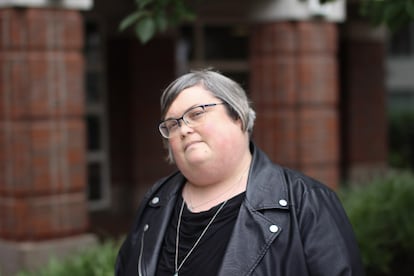Researcher claims Harvard bowed to Meta: “I got pushed out after a $500 million donation from the Chan Zuckerberg initiative”
Disinformation expert Joan Donovan wants an investigation into her dismissal, alleging undue donor influence on the university

In 2018, Professor Joan Donovan began working at Harvard University’s Shorenstein Center on Media, Politics and Public Policy. Her role involved leading a research team studying disinformation and manipulation campaigns on social media. Things seemed to be going smoothly until the Wall Street Journal published a series of articles in September 2021 featuring internal Meta documents leaked by former employee Frances Haugen.
Donovan obtained copies of the thousands of documents that Haugen had taken from Meta, and planned to organize and publish them on a website called Facebook Archive at Harvard. However, she soon ran into trouble during a meeting in October 2021 set up by her supervisor, Dean Douglas Elmendorf. “A former executive of Meta was present during the Zoom conference and he got very angry with me when I revealed that I had possession of the entire cache of Frances Haugen whistleblower documents.” After that meeting, Donovan says something shifted at the university and she became an outsider. University leaders aggressively asked her to justify her work, specifically the research about Facebook.
Donovan said in that meeting that the Haugen papers were the most important documents in the history of internet studies. Just a few days later, Donovan received an email from Elmendorf that he wanted to know more about her research into Meta. “Ever since that meeting, my time at Harvard has not gone easy,” said Donovan. In 2022, she was told her contract would be terminated. In February 2023, her contract termination was announced and became effective in August. Late last year, Donovan publicly denounced Harvard because she believes the university has bowed to Meta’s undue influence.
“My story is a little complicated,’ said Donovan, “but the way that I like to explain it is that Elmendorf, who was my Dean at Harvard, has a very long relationship with several Meta executives, particularly Sheryl Sandberg [Meta’s COO until June 2022]. What we don’t know is the degree to which Facebook or Meta pressured him into stopping my research.”
A $500 million donation over 15 years
Donovan’s departure due to Meta’s alleged pressure on Elmendorf coincided with another milestone for the university in December 2021: the largest donation in Harvard history. Priscilla Chan and Mark Zuckerberg’s Chan Zuckerberg Initiative announced that it would donate $500M to the university over 15 years. “It’s becoming more and more clear to people that donors have undue influence over the administration at Harvard,” said Donovan. “When I got pushed out of Harvard, it coincided with the largest donation in the entire history of the university. The money won’t come all at once, but over 15 years. So, Facebook has bought 15 years of prestige and influence over the largest university brand in the world.” Donovan had raised $12 million in funding for her team’s research, $3 million of which Harvard still has in its coffers. “I hope Harvard returns that money to the donors and that they can reallocate it across the field.” Meta hasn’t commented on this, and the Chan Zuckerberg Initiative stated that its donation is unrelated to these events.
“How Facebook/Meta have operated in this case is no different to how foreign intelligence services or organized criminal enterprises operate,” states Donovan’s well-documented legal disclosure. “If you look at the field of internet studies and you look at who is being funded for what kinds of research, Facebook clearly is giving millions of dollars to researchers in an effort to bolster positive coverage of their platforms,” she said. “And when researchers are critical of them, there have been instances where Facebook has tried to influence publication or to get scholars not to publish... And so it’s very similar to the playbooks of tobacco and big oil, as well as big pharma... in terms of using the university as PR for the corporation.”
Last summer, a large group of well-known academics collaborated with Meta to publish a series of articles in Nature and Science. Donovan holds a skeptical view towards the limited-scope studies and questions their value. “I really can’t call them truly scientific because the actual researchers, what they did is ask questions of the researchers at Facebook and then the researchers at Facebook would give them an interpretation of the data. So the independent researchers never saw the data...In my estimation when you do scientific research, you should collect your own data.” Meta also leveraged the project to present the results in a biased way, says Donovan. “Facebook knew that most people weren’t going to read the entire studies. So Meta put out a press release claiming that the study showed that there were no problems with their algorithms, that there were no issues related to radicalization with their products.”
Harvard's response
Harvard University refuted Donovan’s allegations, arguing that the research project required the oversight of a tenured university professor (Donovan was a contract researcher). But the university could not find a professor to take on the role, according to a Harvard spokesperson. “After the unsuccessful attempt, the project was given over a year to be completed. Joan Donovan was not fired, and most of the research team decided to stay on in different positions.” Donovan believes finding a professor to supervise the research would have been easy. She is currently a professor at Boston University, but Harvard owns the intellectual rights to her research during her time there. Donovan’s legal complaint aims to regain the rights so she can continue her research at Boston University.
Harvard also claims that the Facebook Archive containing Haugen’s documents is available online, just as Donovan planned. However, the archive is very different from what Donovan had envisioned. A keyword search of the archive only displays the slides where the keyword appears. These isolated screengrabs make it challenging to understand their context. “Harvard took the project of the Facebook archive from me,” said Donovan, “and published something that’s nearly unusable. It’s a very difficult system to navigate... My vision was to create a platform that allowed for international collaboration and understanding of those documents... Numerous governments across the globe are trying to understand Meta’s negative influence on teens and younger users... Meta knew there are problems with Instagram and they did nothing about it.”
Donovan is also greatly concerned about academic freedom. Elmendorf made it clear that her project’s termination meant she had no legal protection under academic freedom. “There’s 6,000 staff researchers at Harvard that publish, that are in the same category as me. And anybody that publishes controversial research is not going to do it if their university isn’t going to protect them... So I had to weigh staying at Harvard and publishing these Facebook papers... if Facebook then decides to sue... what he [Elmendorf] was letting me know is they would sue me personally.”
Meta’s PR machine
Donovan believes her case (submitted via Whistleblower Aid, an organization assisting people seeking protection while exposing government or corporate wrongdoing) is just one example of Meta’s public relations strategy. “My story is just a very small piece of this very large puzzle where we have to understand how this corporation and others are setting up our institutions, so that there will be no regulation and there will be no clear research about the true harms caused by these platforms to society.”
Donovan learned about other cases that made her even more suspicious. “What I know about Meta’s PR strategy to kill specific news stories is that they don’t start with the journalist and try to convince them that their story doesn’t have any merit. They start at the top – they start with the board of the news organization. And so I wasn’t surprised at all when I got an email from the dean [Elmendorf] that parroted all of Facebook’s PR.”
Meta isn’t the only platform that can unintentionally cause social harm. For Donovan, the key distinction lies in their response to product defects. “These technologies all have very similar kinds of harm, but what the company does about that harm is just as important as the design of the technology itself. And if the company is doing things to cover up the impact of their products on democracy or public health, then we need to go deeper... to better understand and explore that, because the company itself isn’t going to do it.”
Sign up for our weekly newsletter to get more English-language news coverage from EL PAÍS USA Edition
Tu suscripción se está usando en otro dispositivo
¿Quieres añadir otro usuario a tu suscripción?
Si continúas leyendo en este dispositivo, no se podrá leer en el otro.
FlechaTu suscripción se está usando en otro dispositivo y solo puedes acceder a EL PAÍS desde un dispositivo a la vez.
Si quieres compartir tu cuenta, cambia tu suscripción a la modalidad Premium, así podrás añadir otro usuario. Cada uno accederá con su propia cuenta de email, lo que os permitirá personalizar vuestra experiencia en EL PAÍS.
¿Tienes una suscripción de empresa? Accede aquí para contratar más cuentas.
En el caso de no saber quién está usando tu cuenta, te recomendamos cambiar tu contraseña aquí.
Si decides continuar compartiendo tu cuenta, este mensaje se mostrará en tu dispositivo y en el de la otra persona que está usando tu cuenta de forma indefinida, afectando a tu experiencia de lectura. Puedes consultar aquí los términos y condiciones de la suscripción digital.









































